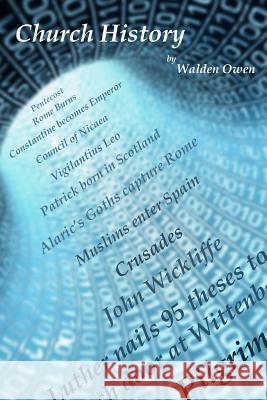Church History: the Gates of Hell will Not Prevail... » książka
Church History: the Gates of Hell will Not Prevail...
ISBN-13: 9781495993169 / Angielski / Miękka / 2014 / 330 str.
In Matthew 16:18 Jesus said, "I will build my church and the gates of hell will not prevail against it." The Church of Jesus Christ was born a very healthy baby. True, it had to grow and it did encounter opposition. However, the struggle did not drag through fifteen centuries until Martin Luther finally broke the chains. From the very beginning a vibrant group of believers formed in the Alpine region of southeastern France and northern Italy. From this secluded area godly missionaries went throughout Europe proclaiming salvation in Christ Jesus. All through the centuries since Jesus' proclamation, the gates of Hell have not been able to stand against the Church of Jesus Christ. excerpt from the book - Church History: As the blanket of Rome's apostasy draped itself over the plains of Lombardy that extended some 200 miles north of Rome toward the rising peaks of the Alps, hundreds of people who were unwilling to accept those errors began to ee to the safety of the mountains. There they would nd a people ready to receive them who already believed as they did. Though the people of the plains had been overcome by apostasy, the people of the mountains had not. In a series of valleys, seemingly carved out by God for this very purpose, the ancient church of the Waldenses thrived. There were seven valleys that formed the territory of the Waldenses. Three of them extended like spokes of a wheel from a common entrance. One was 12 miles long by 2 miles wide. Another formed a huge cup, 50 miles in circumference. At the very ends of these three valleys were the other four which formed the rim of a wheel. Each valley had its own entrance and exit and was laced with caves and huge rocks that formed places of protection. Each valley is related to the other in such a way that one opens into the other, forming an impregnable fortress. Not only were these valleys difficult to invade, but they were also well watered and fertile The antiquity of the Waldenses is strongly supported by history. An ancient poem dating from the year 1100, entitled, The Nobla Leycon, is not only a poem but is also a confession of faith that could only have been composed after a serious study of Christianity in contrast to the errors of Rome. An interesting passage from this early poem speaks of the godliness of the Waldenses, also known as Vaudois. "lf there be an honest man, who desires to love God and fear Jesus Christ, who will neither slander, nor swear, nor lie, nor commit adultery, nor kill, nor steal, nor avenge himself of his enemies, they presently say of such a one he is a Vaudes and worthy of death." (Wylie, vol. i, p. 26; Sir Samuel Morland records the complete Nobla Leycon in his History of the Churches of the Waldenses.)"
Zawartość książki może nie spełniać oczekiwań – reklamacje nie obejmują treści, która mogła nie być redakcyjnie ani merytorycznie opracowana.











